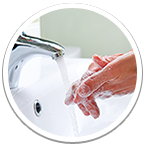HPV vaccine protects against many forms of cancer
The HPV vaccine gives protection against various cancers and other serious health problems caused by the human papillomavirus. Both men and women get cancers caused by the papillomavirus.
HPV stands for Human Papilloma Virus.
All children and young people have access to the HPV vaccine free of charge
The vaccine is included in Finland's national vaccination programme. In Finland, all 10-12-year-olds, i.e. pupils in grades 5 and 6, have the opportunity to get the HPV vaccine free of charge.
If a child or young person has not for some reason received the HPV vaccinations in grades 5–6, they may also receive these free of charge in grades 7–9, upper secondary schools, or vocational institutions.
The vaccine series consists of two doses. For people aged 15 years and over, the vaccine is given in three doses.
Importance of early protection
Human papillomaviruses are very common. In fact, without a vaccine, almost everyone is infected at an early age. The virus is transmitted through the skin and mucous membranes, usually through intercourse. It is, however, possible to get the infection even without having actual intercourse. This means that the use of condoms alone is not enough to provide full protection against HPV.
The vaccine is most effective if given at a young age as it is unlikely that a young person has yet contracted the virus. A young person’s body is also better at producing antibodies. The vaccine cannot cure an already active infection, but it can still protect against later infections.
The HPV vaccine provides excellent protection
While the infection caused by the papillomavirus is usually asymptomatic and does not last long, it can become prolonged and lead to the precursors of cancer in one in every ten people. Some of these infections can progress to cancer. It is impossible to know in advance who will get cancer.
The greatest risk of cancer is associated with two of the HPV strains (virus types 16 and 18) against which the vaccination series provides excellent protection. Research indicates that this protection is also long-lasting – likely lasting up to several decades.
The HPV vaccine prevents numerous cancers
In Finland, the HPV vaccine prevents around 300 cases of cancer annually. About one third of these are cancers that affect men.
Caused by papillomaviruses:
- Cervical cancers
- Some vaginal and vulva cancers
- Some cancers of the head and neck area
- Some cancers of the penis
- Some cancers of the anus
Of these, the most common forms in women and men are cervical cancer and tonsil cancer, respectively. The early detection of some of the forms of cancer caused by HPV is not possible. However, even these cancers can be prevented by the HPV vaccine.
Thanks to HPV vaccinations, fewer people will become ill and die of these types of cancers.
The HPV vaccine also protects against other harms
The cellular changes caused by the papillomavirus are sometimes so minor that they only require monitoring. Nevertheless, such monitoring can be stressful or even frightening.
Cancers and severe cellular changes that develop into precursors to cancer are surgically removed. The dangers and risks associated with these surgeries vary, depending on the part of the body affected. For example, surgeries in the head and neck areas can lead to difficulties in swallowing or talking and may even alter a person's appearance.
Surgical procedures performed on the uterus and cervix may, in turn, cause infertility or premature birth.
Thanks to HPV vaccinations, more and more people will avoid major surgeries and radiation and cytostatic treatments in the future.
The HPV vaccine is tried and tested
In Finland, the HPV vaccine was added to the national vaccination programme in 2013.
The safety of HPV vaccines has been researched extensively. During the 21st century, hundreds of millions of doses of the HPV vaccine have already been administered globally, and these have been found to be safe.
Like all medicines, the HPV vaccine can also have adverse effects. However, not everyone experiences adverse effects. Some of the most common adverse effects include pain and redness at the injection site, headache, nausea, muscle pain or a fever.
In most cases, such symptoms develop within 48 hours of the vaccination and pass in a couple of days. They can be treated with antipyretics and painkillers.
More serious side effects, such as severe allergic reactions, are very rare.
More information about cancers caused by papillomaviruses and the HPV vaccine is available from school nurses or public health nurses for students.
Human papillomavirus, HPV (Vaccination-info.eu)
Prevention and control measures for human papillomavirus (European Centre for Disease Prevention and Control, ECDC)
Human papillomavirus, HPV (World Health Organization, WHO)




